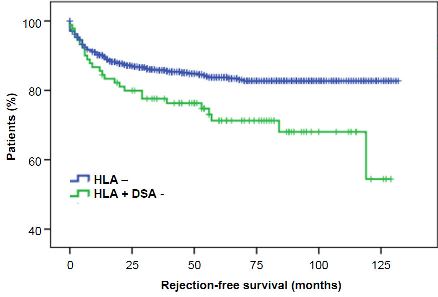De Novo, Non-Donor Specific HLA Antibodies Are Associated with Inferior Allograft Outcomes After Kidney and Simultaneous Kidney-Pancreas Transplantation.
1Renal and Transplant Centre, Imperial College Healthcare NHS Trust, London, United Kingdom
2Histocompatibility and Immunogenetics, Imperial College Healthcare NHS Trust, London, United Kingdom
3Blood Transfusion, Imperial College Healthcare NHS Trust, London, United Kingdom
Meeting: 2017 American Transplant Congress
Abstract number: 48
Keywords: Antibodies, Graft failure, HLA antibodies, Kidney transplantation
Session Information
Session Name: Concurrent Session: Kidney HLA Antibodies
Session Type: Concurrent Session
Date: Sunday, April 30, 2017
Session Time: 2:30pm-4:00pm
 Presentation Time: 2:42pm-2:54pm
Presentation Time: 2:42pm-2:54pm
Location: E354b
Introduction: Donor specific antibodies [DSAs] occurring after transplantation are associated with poorer outcomes. However the significance of non-donor directed HLA antibodies [ndHLAs] after transplantation in unsensitised patients is less well understood. In this study, we establish the significance of ndHLAs in a large unsensitised cohort of transplant patients
Methods: We retrospectively analysed 752 non-sensitised patients who underwent a kidney or SPK transplant from November 2005 to December 2015. All patients received monoclonal antibody induction, followed by tacrolimus monotherapy. Patients were screened for HLA and DSA at 3, 6, 12 months and yearly thereafter by Luminex technology. Positivity was defined as the presence of the antigen in at least 2 samples.
Results: 91/752 [12%] developed ndHLAs; [Class I: 73%, Class II: 24%, Class I+II: 3%]. Patients with ndHLAs were more likely to have rejection [p=0.004] [fig1], in particular T-cell mediated [p=0.006] and graft loss [p=0.005]. This risk remained following correction for total mismatch, graft number and DGF [HR 1.85(1.20-2.86), p=0.005]. Patient loss was not significant [p=0.072]. Multivariate analysis showed that previous pregnancies [OR 2.21(1.25-3.91), p=0.006] and transfusions within the first year of transplantation [OR 1.72(1.03-2.86), p=0.039] were associated with ndHLA development. The median time to developing HLA from transplantation was 849 days [97-1882]; this was quicker in patients with previous pregnancies [p=0.018].
Discussion: ndHLA development in unsensitised patients is associated with a significant risk of rejection and graft loss and are associated with pregnancy and transfusions.
CITATION INFORMATION: Hassan S, Lucisano G, Santos E, McKeown D, Goodall D, Gueret-Wardle A, McLean A, Brooks P, Willicombe M, Taube D. De Novo, Non-Donor Specific HLA Antibodies Are Associated with Inferior Allograft Outcomes After Kidney and Simultaneous Kidney-Pancreas Transplantation. Am J Transplant. 2017;17 (suppl 3).
To cite this abstract in AMA style:
Hassan S, Lucisano G, Santos E, McKeown D, Goodall D, Gueret-Wardle A, McLean A, Brooks P, Willicombe M, Taube D. De Novo, Non-Donor Specific HLA Antibodies Are Associated with Inferior Allograft Outcomes After Kidney and Simultaneous Kidney-Pancreas Transplantation. [abstract]. Am J Transplant. 2017; 17 (suppl 3). https://atcmeetingabstracts.com/abstract/de-novo-non-donor-specific-hla-antibodies-are-associated-with-inferior-allograft-outcomes-after-kidney-and-simultaneous-kidney-pancreas-transplantation/. Accessed February 9, 2026.« Back to 2017 American Transplant Congress
